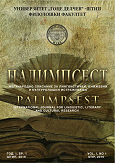WHEN ARE STUDENTS AT THEIR PEAK PERFORMANCE?
Abstract
Previous studies focusing on students' productivity have shown that different times of the day impact students' productivity and efficiency. Psychology and biology explain that the circadian rhythm is a key factor influencing students' performance during lessons and exams in the morning hours. Additionally, small changes in scheduling can affect students' performance. This study tested several hypotheses in this regard and gathered the necessary data to provide valuable insights into how students are affected by the learning process and their schedules. The results revealed that students feel more productive during the late-morning and early-afternoon hours, and they prefer the most important university activities to be scheduled during this time. Furthermore, their alertness is higher in the afternoon compared to the morning. This study provides insights into university students' feelings regarding alertness, the influence of university schedules, sleeping patterns, preferences, and similar factors, from which several practical implications are derived.
Keywords: productivity; schedule; alertness; morning; afternoon; university students.
Downloads
References
Cruz, R. A. (2022). Class schedule and performance: Does time of the day affect students’ learning? IEEE-SEM, 10(2), 22-28.
Edwards, F. (2012). Early to rise? The effect of daily start times on academic performance. Economics of Education Review, 31(6), 970-983. doi:10.1016/j.econedurev.2012.07.006
Hansen, M., Janssen, I., Schiff, A., Zee, P. C., & Dubocovich, M. L. (2005). The impact of school daily schedule on adolescent sleep. Pediatrics, 115(6), 1555-1561. doi:10.1542/peds.2004-1649
Horne, J. A., & Östberg, O. (1976). A self-assessment questionnaire to determine morningness-eveningness in human circadian rhythms. International Journal of Chronobiology, 4(2), 97-110.
Jankowski, K. (2015). Composite Scale of Morningness: Psychometric properties, validity with Munich ChronoType Questionnaire, and age/sex differences in Poland. European Psychiatry, 30(1), 166-171. doi:10.1016/j.eurpsy.2014.01.004
Morales, J. A., & López, A. (2004). Composite and preferences scales of morningness: Reliability and factor invariance in adult and university samples. The Spanish Journal of Psychology, 7(2), 93-100. doi:10.1017/S1138741600004790
Paciello, M., Quante, M., Weidenauer, R., Rueschman, M., Nieratschker, V., Poets, C. F., & Randler, C. (2022). Validity of chronotype questionnaires in adolescents: Correlations with actigraphy. Journal of Sleep Research, 31(e13576), 1-9. doi:10.1111/jsr.13576
Pope, N. G. (2016). How the time of day affects productivity: Evidence from school schedules. The Review of Economics and Statistics, 98(1), 1-11. doi:10.1162/REST_a_00525
Smith, C., Reilly, C. and Midkiff, K. (1989) Evaluation of Three Circadian Rhythm Questionnaires with Suggestions for an Improved Measure of Morningness. Journal of Applied Psychology, 74, 728-738. http://dx.doi.org/10.1037/0021-9010.74.5.728
Wolfson, A. R., & Carskadon, M. A. (2005). A survey of factors influencing high school start times. Sage Journals, 89(642), 47-63. doi:10.1177/019263650508964205





